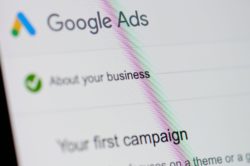Top Class Actions’s website and social media posts use affiliate links. If you make a purchase using such links, we may receive a commission, but it will not result in any additional charges to you. Please review our Affiliate Link Disclosure for more information.
Google is now facing a Canadian class action lawsuit alleging that the Internet mogul misrepresented to users how much control they have over the information they share when they browse the web using incognito mode. The Google class action lawsuit claims that regardless of the browsing mode chosen, Google collects users’ browsing data without consent.
Thousands of Quebec Google Users Targeted
The motion to institute a Google class action lawsuit was filed on June 23 at Montreal’s Palais de Justice. The lead plaintiff, Louis-Alexandre Leclaire believes that all Quebec Internet users who used incognito browsing on Google Chrome are entitled to compensation for the advertising value of the data collected during their use of incognito mode on Google.
According to the Google class action lawsuit, most websites use Google services, such as Google Analytics, “rendering the promise of confidentiality made by Google practically illusory.”
Class Members include any resident of Quebec “who has browsed the web using incognito browsing mode on a website using one of the advertising or analysis services offered by Google such as Google Analytics, Google Ad Manager or the ‘Sign in with Google’ login button.”
Louis-Alexandre estimates that the number of Quebec Google incognito mode users whose data was collected by Google is at least “several thousand.” According to a survey commissioned by Google’s competitor DuckDuckGo, 46% of Americans use Google Chrome’s incognito mode at least once. Additionally, over 29 million websites worldwide use Google Analytics, which is another Google services at issue in this class action lawsuit.
Google Incognito: “Private” but not Confidential
Private browsing is a feature offered under slightly different names by various web browsers, including Safari, Firefox and Google Chrome. It promises to allow users to “browse the web in complete privacy” and, more specifically, to erase cookies and other information after each session.

The Google class action lawsuit takes issue with the roundabout way in which Google collects and retains information for advertising purposes, even when users brows in incognito mode. Google’s data collection mechanics are complex and involve services that allow the web browser to become the dominant player in online advertising through Google Analytics, Google Ad Manager and the use of “Sign in with Google” buttons. Google collects information about Internet users visiting a site using one of these tools and combines it to build an advertising profile, according to the Google class action lawsuit.
The Google class action lawsuit alleges that the conglomerate “illegally violates users’ fundamental privacy rights” by collecting users’ data without consent. Indeed, Canada’s federal and provincial private-sector privacy laws require corporations to obtain meaningful consent for the collection, use and disclosure of personal information, something Google neglected to do.
Google Incognito Privacy Loophole
When a site using one of Google’s advertising tools is visited by a user in incognito mode, the user is tagged with a unique identifier that theoretically allows Google to follow the user. This identifier exists independently of the user, and is not deleted at the end of the session. The Google class action lawsuit notes that the Firefox browser allows users to block this process, but not Google Chrome.
Not long before the Quebec class action lawsuit was introduced, three U.S. Google Chrome users filed a similar class action lawsuit accusing Google of collecting user data even when they browse in incognito mode.
Like the Quebec class action lawsuit, the U.S. Google tracking lawsuit asserts that Google effectively tricks users into thinking that they have control over how much of their data is shared with Google and other parties.
According to the plaintiffs, data is collected even when browsing in Google incognito mode, or when consumers control privacy settings. Allegedly, this violates consumer privacy as well as federal wiretap laws.
The Quebec Google class action lawsuit seeks an order requiring Google to pay Class Members a sum equal to the value of the data collected while Class Members were using incognito mode, and $50 million in punitive damages.
Do you use Google Chrome and incognito mode? Are you concerned about Google’s privacy breaches? Share your thoughts with us in the comments below!
Class Members are represented by Belleau Lapointe, S.E.N.C.R.L.
The Google Class Action Lawsuit is Louis-Alexandre Leclaire v. Google LLC, Case No. 500-06-001079-207, in the Superior Court of Québec, Canada.
Read More Class Action Lawsuit & Settlement News:
Facial Recognition Class Action Lawsuit Targets RCMP Database
Cargill Meat-Packing Plant Faces Class Action Lawsuit After Deadly COVID-19 Outbreak
Long Term Disability Lawyer | Insurance Claim Denial Help
Canada Roundup Glyphosate Cancer Class Action Lawsuit Investigation
ATTORNEY ADVERTISING
Top Class Actions is a Proud Member of the American Bar Association
LEGAL INFORMATION IS NOT LEGAL ADVICE
Top Class Actions Legal Statement
©2008 – 2024 Top Class Actions® LLC
Various Trademarks held by their respective owners
This website is not intended for viewing or usage by European Union citizens.


















17 thoughts onGoogle Hit With Class Action Lawsuit Over Not So Private Incognito Mode
Please add me
Please add me to this class action.
Please add me to this class action
I’m not one bit surprised I for one think websites like Google and others are highly over rated when it comes to privacy. And nothing but pure mockery. And more or less the exact opposite and actually nothing but total invasion of privacy.
Anyways, I find I ve had more virus attacks when using inconito mode actually …I try not use Google as much as possible now . Due to its ridiculous privacy clauses …why is it that to use the internet there’s all this tracking non sense IP address etc etc. Nothing you do on the web is actually private and it should be because it actually is nothing but invasion of privacy to begin with..anc
Please add me to the list I’ve been using it as well,I feel violated.